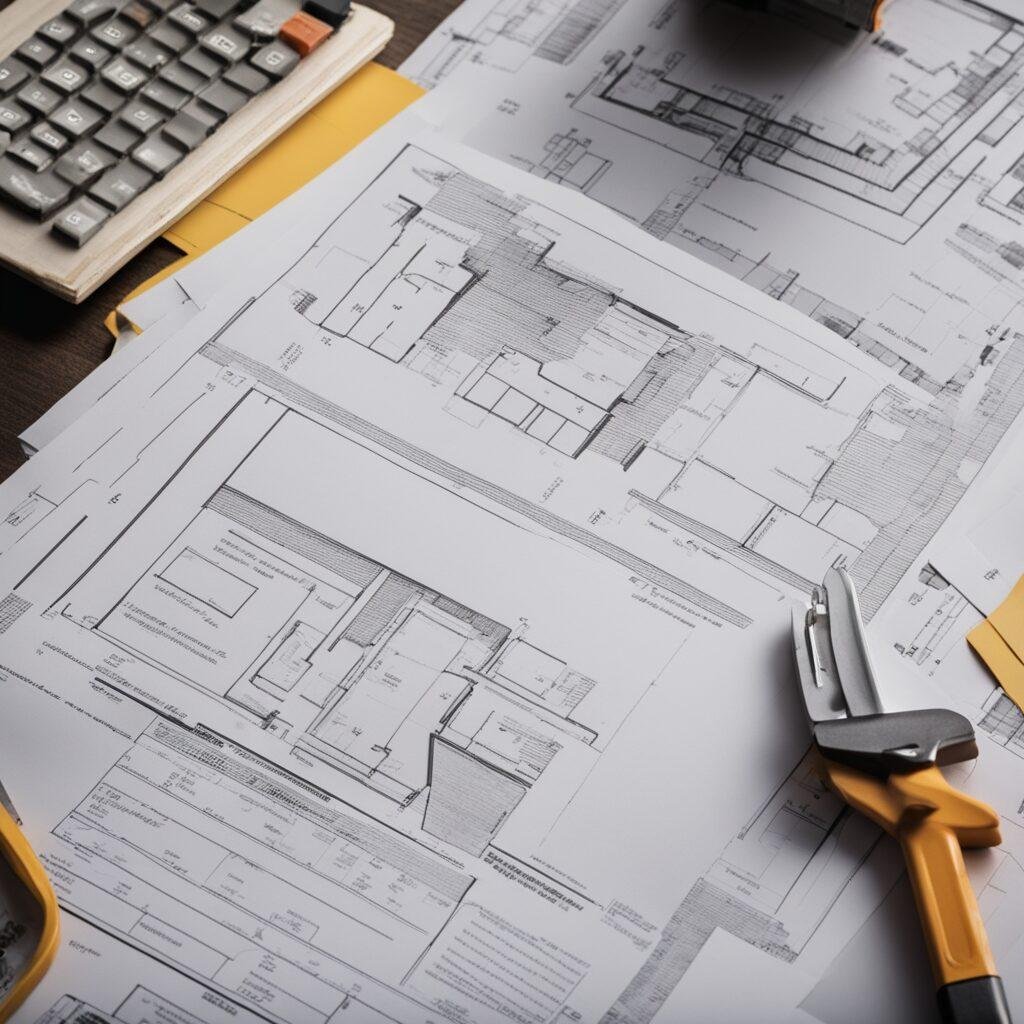The Ultimate Guide to Home Renovation: Everything You Need to Know
The idea of a home renovation can be both exhilarating and intimidating. Whether you’re a seasoned homeowner looking to add value to your property or a newbie who’s just managed to buy a house, the journey from envisioning to realizing your dream living space is filled with numerous decisions, tasks, and, let’s face it, some stress. This ultimate guide aims to be your comprehensive resource for navigating the complex world of house renovation. From understanding the role of professionals like structural engineers and architects to the nitty-gritty of budgeting and obtaining planning permission, we’ve got you covered.
Renovating your home isn’t just about slapping a new coat of paint or changing the furniture; it’s about enhancing your living space to better suit your lifestyle and needs. It could involve anything from a simple bathroom renovation to complex extension ideas, or even a complete garage conversion. The scope can be as small or as large as you want it to be. However, the key to a successful renovation project lies in meticulous planning, realistic budgeting, and the right execution.
In this ultimate guide, we’ll walk you through each phase of the renovation process. We’ll discuss why renovating your home is a worthwhile investment, how to go about planning and budgeting for it, the legal requirements you’ll need to consider, and the professionals you’ll need to hire. We’ll also delve into the common mistakes to avoid and provide actionable tips to ensure your home renovation is a resounding success.
So, whether you’re planning a loft conversion, pondering the cost of an extension, or simply looking for home renovation ideas, this guide is your go-to resource.
Why Home Renovation is Crucial


The Value Proposition: More Than Just Aesthetics
When you decide to renovate a house, it’s not just about making it look pretty. The house renovation project can significantly add value to your home. According to the Federation of Master Builders, a well-executed renovation can increase the value of your home by up to 20%. This is particularly true if you’re buying a house to renovate; choosing the worst house on the best street can offer the best return on investment.
Energy Efficiency: A Step Towards Sustainability
In England and Wales, building regulations have become increasingly stringent, especially concerning energy efficiency. A home renovation project provides an excellent opportunity to upgrade your electrics, insulation, and heating systems. This not only reduces your carbon footprint but also results in long-term savings on energy bills.
Customization: Making the House a Home
Home improvements aren’t just about increasing the value of your home; they’re about enhancing your quality of life. Whether it’s kitchen renovations or design ideas for a cozy reading nook, renovation allows you to customize your living space to suit your lifestyle. If you’re buying a home that’s a fixer-upper, renovation gives you the chance to make the house truly yours.
Legal Leverage: Permitted Development and Planning Consent
In some cases, a home renovation can fall under permitted development, which means you won’t need planning consent from your local authority. However, it’s crucial to check with your local planning office, especially if you live in a conservation area or own a Victorian house.
The Renovation Checklist: Your Roadmap to Success
A successful renovation work requires a clear schedule of works. This renovation checklist will serve as your roadmap, outlining what needs to be done in the correct order. Whether it’s structural work or aesthetic improvements, having a checklist can help you manage your renovation budget and ensure that the renovation process runs smoothly.
The Role of a Structural Engineer in Home Renovation


Assessing Structural Integrity: The Foundation of Your Project
Before you even think about structural work like tearing down walls or adding an extension, it’s crucial to consult a structural engineer. These professionals can assess the condition of the property, ensuring that the building work you’re planning is both feasible and safe. They can tell you whether a wall is load-bearing, if your roof space needs reinforcement, or if your floorboard conditions will affect your renovation plans.
Planning Structural Changes: More Than Just Aesthetics
If you’re considering significant changes like a loft conversion or an extension, a structural engineer will provide the necessary calculations and plans. They can help you understand the costs of materials and labor, giving you an idea of your renovation budget. This is particularly important if you’re buying a renovation property to ensure you don’t overshoot your budget.
Collaborating with Other Professionals: A Team Effort
Structural engineers often work hand-in-hand with architects and builders. They ensure that the schedule of works is followed in the correct order, and that all building regulations and planning consent requirements are met. If you’re unsure how to find a builder to carry out the work, your structural engineer can often provide recommendations.
Navigating Legal Requirements: Building Regulations and More
In England and Wales, building regulations approval is a must for most types of building renovation. Your structural engineer will be well-versed in these regulations and can guide you through the process, ensuring that your project is compliant. This is especially important if you’re looking to add value to a property in a way that may affect its structural integrity.
Common Mistakes to Avoid: A Word of Caution
One common renovation mistake is to proceed with building work without consulting a structural engineer, only to find out later that the work isn’t compliant with local authority regulations or that it has compromised the structural integrity of the property. Always consult a structural engineer to avoid such pitfalls.
Budgeting for Your Home Renovation


The Importance of a Well-Defined Budget: Your Financial Blueprint
When it comes to home renovation, one of the most daunting aspects is budgeting. A well-defined budget acts as your financial blueprint, guiding you through the renovation process. It helps you allocate funds for different aspects of the project, from structural work to aesthetic improvements. Without a proper budget, the costs of materials and labor can quickly spiral out of control, turning your dream home renovation project into a financial nightmare.
Cost Factors to Consider: Where Your Money Goes
When budgeting for a home renovation, it’s crucial to consider various cost factors. These include:
- Material Costs: From lumber to paint, list down all the materials you’ll need and their estimated costs.
- Labor Costs: Factor in the cost of hiring professionals like structural engineers, architects, and tradespersons.
- Permit Fees: Don’t overlook the costs associated with obtaining necessary permits and inspections from your local authority.
How to Allocate Funds: The Art of Financial Planning
Once you have a clear understanding of the costs involved, the next step is to allocate funds. Here are some tips:
- Contingency Fund: Always set aside a contingency fund for unexpected expenses. This is particularly important if you’re buying a house to renovate.
- Prioritize: Decide which aspects of the renovation are most important to you and allocate funds accordingly. For example, if a loft conversion is your primary goal, make sure you allocate sufficient funds for it.
Getting Quotes: The More, The Merrier
When it comes to hiring professionals, it’s advisable to get at least three quotes. This will give you a clear idea of the market rates and help you make an informed decision. Remember, the cheapest quote doesn’t always mean the best service. Always consider the reputation and experience of the professionals you’re looking to hire.
Common Budgeting Mistakes to Avoid
One of the most common renovation mistakes is underestimating costs. Whether it’s the cost of an extension or the three-bedroom home you’re renovating, always have a contingency fund. Another mistake is not having a clear schedule of works, which can lead to delays and increased costs.
Planning and Design


The Blueprint of Success: Why Planning Matters
A successful home renovation doesn’t happen by accident; it requires meticulous planning and thoughtful design. A comprehensive plan serves as the blueprint for your renovation project, outlining what needs to be done and when. This is especially crucial if you’re buying a house to renovate or if you’re working on a Victorian house, where the layout and condition of the property may present unique challenges.
Architectural Drawings: The Visual Guide
Architectural drawings provide a visual representation of your home renovation ideas, helping both you and the professionals you hire to understand the project’s scope. These drawings are often prepared in collaboration with a structural engineer to ensure that the structural work is sound and compliant with building regulations.
Software Tools: The Digital Advantage
In today’s digital age, CAD software and 3D modeling tools can offer significant advantages in planning your home renovation project. These tools allow you to visualize the layout of the property, making it easier to plan and make adjustments as needed. They can also help you avoid common renovation mistakes, such as poor space utilization or impractical design ideas.
Legal Aspects: Crossing the T's and Dotting the I's
When it comes to home improvements, crossing the t’s and dotting the i’s isn’t just a good practice—it’s a legal necessity. You may need planning permission from your local planning office, especially if your renovation work involves major structural changes or additions. Even if planning permission isn’t required, you’ll still need to comply with building regulations to ensure that the building renovation is safe and energy-efficient.
Common Pitfalls: What to Watch Out For
One common pitfall is rushing into the renovation project without a well-thought-out plan. It’s important not to rush the planning phase, as hasty decisions can lead to costly mistakes down the line. Another mistake is neglecting to consult professionals like structural engineers and architects, which can result in non-compliance with building regulations and potential structural issues.
Legal Requirements


Planning Permissions: The Green Light for Your Project
In the realm of home renovation, planning permission is often the first legal hurdle you’ll encounter. Depending on the scope and location of your renovation project, you may need to obtain permission from your local authority. This is particularly true if you’re planning major structural changes, such as an extension, or if your property is located in a conservation area. It’s crucial to check with your local planning office to understand what’s required.
Building Regulations: The Rule Book
Even if planning permission isn’t required, you’ll still need to adhere to building regulations. These rules, applicable in England and Wales, ensure that the building work is safe, energy-efficient, and up to code. Your structural engineer and architect will be well-versed in these regulations and can guide you through the compliance process.
The Party Wall Act
If your home renovation involves work that affects a shared wall between you and your neighbour, you’ll need to be aware of the Party Wall Act. This legislation requires you to notify your neighbours in advance and obtain their consent for any work that could affect the shared party wall.
Permitted Development Rights: The Exceptions to the Rule
Some home improvements may fall under permitted development rights, which means you won’t need planning consent. However, it’s always best to consult with professionals to ensure that your renovation work truly qualifies as permitted development.
Common Legal Mistakes to Avoid: A Word to the Wise
One common legal mistake is to proceed with the renovation work without obtaining the necessary permissions, leading to potential legal issues and fines. Another is misunderstanding or ignoring building regulations, which can result in work having to be undone at your expense.
Choosing the Right Professionals


The Importance of Expertise: Your Dream Team
When it comes to home renovation, the expertise of the professionals you hire can make or break your project. From structural engineers to architects and builders, each plays a critical role in turning your home renovation ideas into reality. Therefore, it’s crucial to assemble a team of experts who can guide you through the complexities of building work, building regulations, and schedule of works.
Finding a Reliable Structural Engineer: The Backbone of Your Project
A structural engineer is often the unsung hero of any home renovation project. They assess the structural work required, collaborate with architects, and ensure that your home is both safe and compliant with building regulations. Look for certifications, reviews, and a portfolio that showcases their experience with projects similar to yours.
What to Look for in an Architect: The Visionary
An architect brings your home renovation ideas to life through detailed plans and architectural drawings. They also help in obtaining planning permission and can offer creative solutions to maximize living space and add value to your home. When choosing an architect, consider their style, previous work, and willingness to collaborate with other professionals like structural engineers.
Selecting a Builder: The Maestro of Construction
The builder is the maestro who orchestrates the building work, ensuring that everything runs smoothly from the first fix to the finishing touches. Word-of-mouth and references are often the best ways to find a trustworthy builder. Make sure they provide a detailed contract outlining the scope of work, timeline, and costs.
Tradespersons and Other Experts: The Supporting Cast
Don’t underestimate the importance of skilled tradespersons like electricians, plumbers, and carpenters. They handle the specialized tasks that bring the whole project together. It’s often best to hire tradespersons who have worked with your builder or architect before, as this ensures a more cohesive renovation process.
Common Mistakes to Avoid: Red Flags
One common mistake is hiring professionals solely based on cost. While budget is important, expertise and reliability should never be compromised. Another red flag is not checking references or reviews, which can lead to hiring individuals who are not up to the task.
The Renovation Process


Demolition and Site Preparation: The Ground Zero
The first step in any home renovation project is often the most dramatic: demolition. This involves removing old fixtures, tearing down walls, and preparing the site for renovation. It’s essential to consult with your structural engineer to ensure that any structural work is planned correctly, especially if you’re dealing with an old home or a Victorian house.
Structural Changes and Reinforcements: The Framework
Once the site is prepared, the next step involves making any structural changes. This is where your structural engineer plays a crucial role, ensuring that all changes are safe and up to code. Whether you’re adding a loft conversion, garage conversion, or an extension, meticulous planning and adherence to building regulations are key.
First Fix and Second Fix: The Nuts and Bolts
The first fix involves the initial installation of services like electrics, plumbing, and heating, which need to be completed before the walls are sealed. The second fix comes later, where things like sockets, switches, and radiators are installed. Both stages require specialized tradespersons to ensure quality and compliance.
Finishing Touches: The Final Flourish
The final step involves the finishing touches, such as painting, installing new fixtures, and final inspections. This is also the time to double-check that all building work meets building regulations and that you’ve adhered to your renovation checklist. Whether it’s installing windows and doors or finalizing kitchen renovations, the finishing touches bring your vision to life.
Common Pitfalls: Lessons Learned
Even with the best planning, home renovation projects can hit snags. One common mistake is underestimating the costs of materials and labor, leading to budget overruns. Another is ignoring or bypassing building regulations, which can result in costly and time-consuming corrections.
Common Mistakes to Avoid


Underestimating Costs: The Budget Buster
One of the most common renovation mistakes is underestimating costs. Whether it’s the cost of an extension or the costs of materials, always have a contingency fund for unexpected expenses. This is where a clear schedule of works and a well-defined renovation budget come into play.
Ignoring Structural Issues: A House of Cards
Ignoring structural issues can lead to costly and dangerous problems down the line. Always consult a structural engineer for any changes that could affect your home’s integrity. This is especially true if you’re dealing with period properties or planning significant structural work.
Skipping the Legalities: A Tangled Web
Skipping over planning permission or ignoring building regulations can lead to a legal quagmire. Always ensure you have the necessary permissions and that your building work is up to code. Consult your local authority and professionals to avoid this renovation mistake.
Poor Planning: The Domino Effect
Poor planning can have a domino effect on your home renovation project. Whether it’s a poorly thought-out design idea or a lack of a clear schedule of works, poor planning can derail even the most promising renovation project.
Overlooking Small Details: The Devil is in the Details
It’s easy to get caught up in the big picture and overlook small but crucial details. Whether it’s the quality of floorboards, the condition of chimney stacks and pots, or the stability of existing electrics, these small details can have a big impact on the final result.
Final Thoughts: Your Blueprint for Success


Home renovation is a complex but rewarding endeavor that can significantly enhance your quality of life and increase the value of your home. From understanding the crucial role of a structural engineer to meticulous budgeting and detailed planning, each step is vital to the success of your home renovation project.
Whether you’re a seasoned homeowner looking to add value to your property or a newbie embarking on your first house renovation project, this ultimate guide aims to provide you with the tools and knowledge you need to navigate the complexities of renovating a home.
Remember, the devil is in the details. Don’t rush the process; instead, invest time in planning, budgeting, and selecting the right professionals. This will not only save you time and money but also ensure that your home improvements meet your expectations.
Take the First Step Today
Ready to transform your home? Don’t embark on this journey alone. Consult a structural engineer, architect, and other professionals to ensure your home renovation is a resounding success. Start by creating a renovation checklist, consult with your local planning authority, and read our guide to arm yourself with all the information you need.



- Head Office: Corwell Lane, Uxbridge, England, UB8 3DE.
- + (44) 07359 267907
- info@structuralengineercalcs.com


